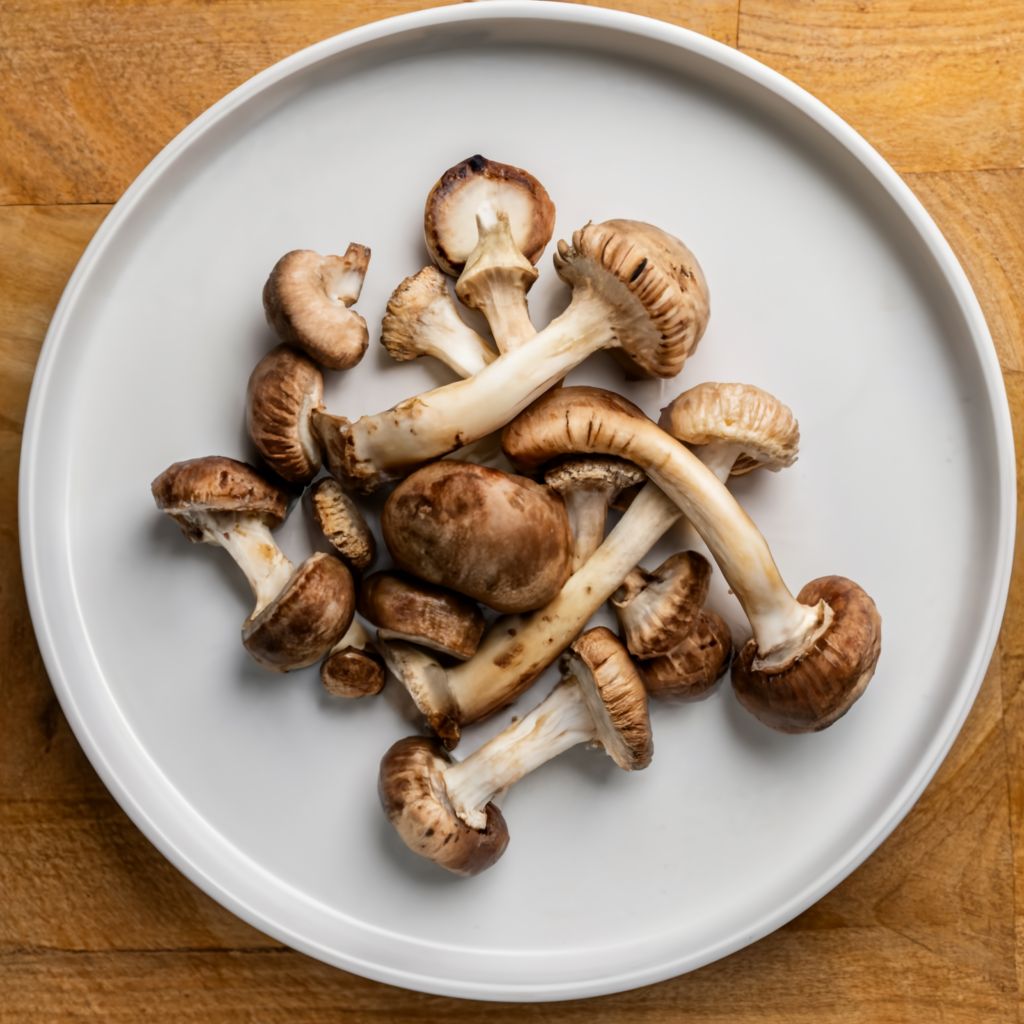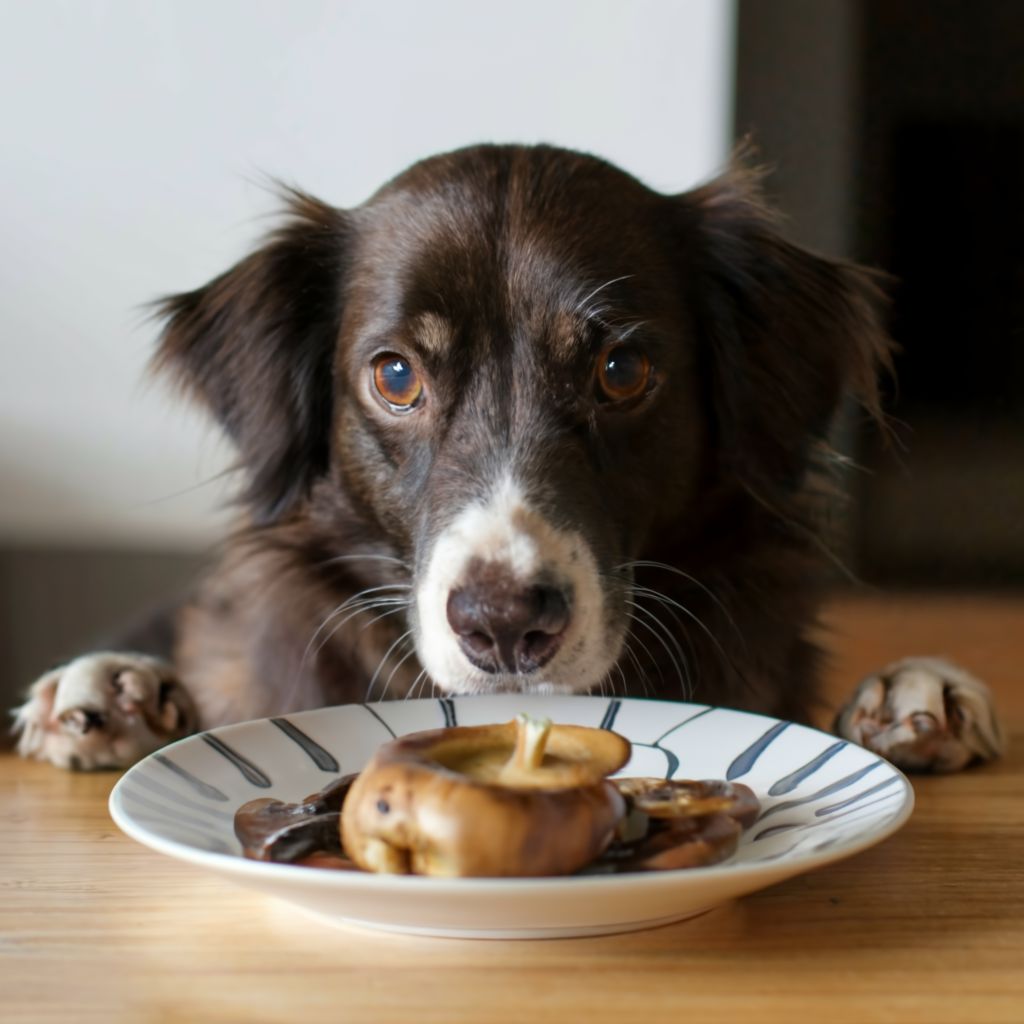Can Dogs Eat Mushrooms: What You Need to Know?

Can Dogs Eat Mushrooms: What You Need to Know?
Imagine fluffy clouds drifting across the sky – soft, gentle, and inviting. Now let’s talk about mushrooms. Can a dog eat mushrooms? Just like those clouds, this question may seem light and airy, but the answer requires a deeper look. Both humans and dogs are fascinated by the rustic charm and variety of mushroom shapes. But are they safe for our furry friends? Let’s look at this issue plain and simple to ensure the well-being of our canine companions.
Can dogs eat mushrooms safely?
When it comes to mushrooms, safety is key for our furry friends. Certain types of mushrooms are harmless to dogs, while others can be deadly. Knowing which mushrooms are safe and which to avoid is important to your dog’s well-being. While store-bought mushrooms, such as button mushrooms, are generally safe in small amounts, wild mushrooms can be dangerous and should be avoided altogether. Introducing mushrooms into your diet at a slow pace can lead to digestive difficulties in some dogs, even those who have eaten them. Before introducing mushrooms to your dog, it is recommended to seek advice from a veterinarian.
Are certain mushrooms toxic to dogs?
Our mushrooms are a multi-species beast, with some being highly prized for their culinary brilliance and others posing sturdier risks, especially to our poops. Certain types of mushrooms are both safe and effective for dogs, but some may contain harmful substances that can be fatal if consumed. Our dogs can be protected from harm by recognizing the difference between food and poisonous strains. Certain types of mushrooms, like Amanita, may be toxic to dogs, resulting in serious symptoms that require medical attention if they consume them. Therefore, knowing which mushrooms are safe and which to avoid is important for responsible pet ownership.

What are the risks of dogs consuming wild mushrooms?
Indeed, there are some risks associated with eating wild mushrooms. Certain natural mushrooms are relatively harmless, but others can be extremely poisonous and endanger our furry companions. Dogs may accidentally consume poisonous mushrooms while exploring outdoor areas like parks or woodlands. Ingestion of poisonous mushrooms can cause symptoms ranging from mild gastrointestinal distress to severe poisoning, organ failure, and even death. As a result, pet owners should avoid feeding their dogs foreign mushrooms. Prompt veterinary attention is essential for safety and well-being if a dog is suspected of eating wild mushrooms.
can dogs eat cream of mushroom soup?
Mushroom soup is generally not recommended for dogs. While mushrooms themselves may be safe for dogs in small amounts, many ingredients in mushroom soup, such as onion, garlic, cream and spices, can be harmful or toxic to dogs.In addition, cream soups are high in fat and sodium, which can lead to indigestion or other health issues for dogs. Why is this so?Ensure that your dog does not consume cream of mushroom soup and instead opts for safer, more appropriate choices. If you are unsure if a particular food is safe for your dog, it is always best to consult your veterinarian.
Are there any health benefits to feeding mushrooms to dogs?
There are indeed many benefits to feeding dogs mushrooms. These mushrooms are not just delicious additions to our meals; they also offer a variety of potential health benefits to our furry companions. The health and well-being of dogs can be improved by consuming mushrooms, which are rich in vitamins, minerals or antioxidants. Shiitake and maitake mushrooms, along with other varieties, contain compounds that can boost the immune system and have anti-inflammatory effects. The low calorie and fat content of mushrooms makes them a healthy choice for dogs on dietary restrictions. Providing your dog with mushrooms should be done in a way that they are safe to consume. Always consult your veterinarian before adding new foods to your dog’s diet to ensure they are appropriate for their individual health needs.
What should I do if my dog eats a mushroom from the yard?
If your dog eats mushrooms outside, it’s important to act quickly to ensure his safety. Follow as follows:
Remove the mushrooms that are still around to keep your dog from eating more.
If possible, identify the mushroom. Take a photo of the mushroom or take a sample to show your vet.
Watch your dog closely for signs of poisoning, which may include vomiting, diarrhea, drooling, lethargy, tremors, seizures or changes in behavior.
Contact your vet. immediately for teaching. Tell them what mushroom your dog ate and what symptoms they are experiencing.
Follow your vet’s instructions carefully.Their recommendations may vary based on the severity of the situation, and they may also suggest administering activated charcoal or taking the dog to emergency room.
See your vet right away if your dog shows signs of mushroom poisoning, even if the symptoms are mild at first.It is essential to get early for a positive outcome.
Keep in mind that some mushrooms are toxic to dogs, and it is always recommended to avoid eating them. Your pet’s well-being is dependent on prompt veterinary treatment.
Can dogs eat cooked mushrooms?
Is it safe to feed my dog cooked mushrooms? This is a common question asked by pet owners who want to ensure their pets are fed nutritious and varied food. Although the culinary world offers a variety of delicious mushroom dishes, pets should be careful when putting cooked mushrooms in a dog’s food. Although some cooked mushrooms can be good for dogs to eat safely in moderation, others can pose a health hazard to them. We are investigating aspects of eating cooked mushrooms and dogs to ensure the well-being of our furry friends.
Are there any signs of mushroom poisoning in dogs?
There are several indications that dogs may be at risk of being poisoned by mushrooms. These may include:
- Vomiting
- Diarrhea
- Drooling
- Lethargy
- Weakness
- Tremors or shaking
- Seizures
- Abdominal pain
- Lack of appetite
- Changes in behavior or coordination
Your dog may have been exposed to a poisonous mushroom, and any of these symptoms should prompt medical attention from your veterinarian.The best outcome for your dog if you’re poisoned by mushrooms is to receive prompt medical treatment.
Before introducing any new food to your dog’s diet, it’s a good idea to consult with your veterinarian. Your dog’s health, size, weight, and dietary requirements can be taken into account when seeking advice from them. Additionally, it’s important to be aware of potential choking hazards — unpopped kernels, for example — and make sure not to let your dog walk around while you have popcorn.
